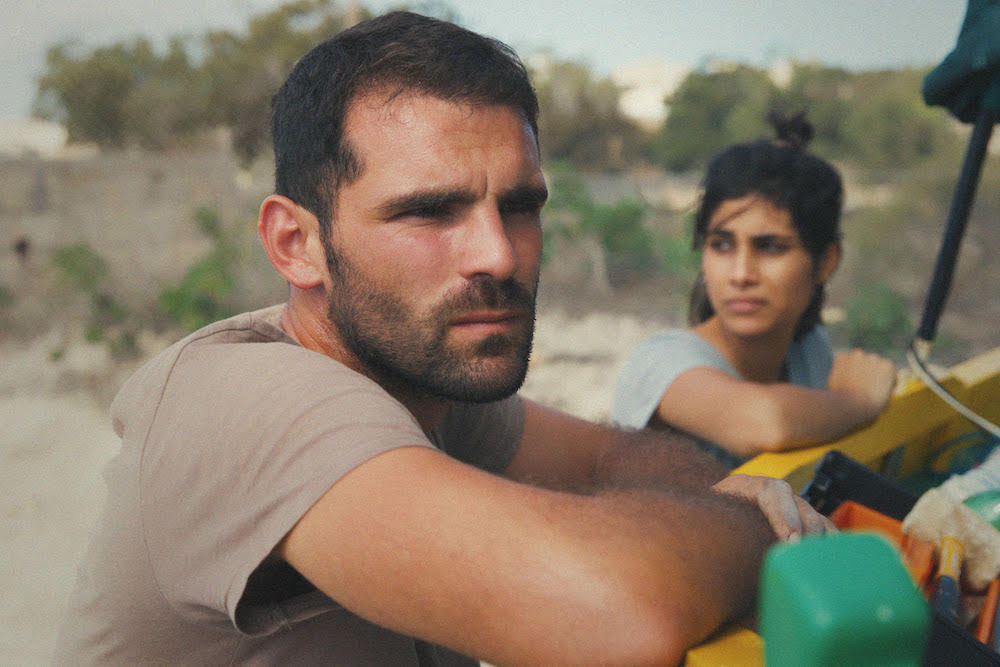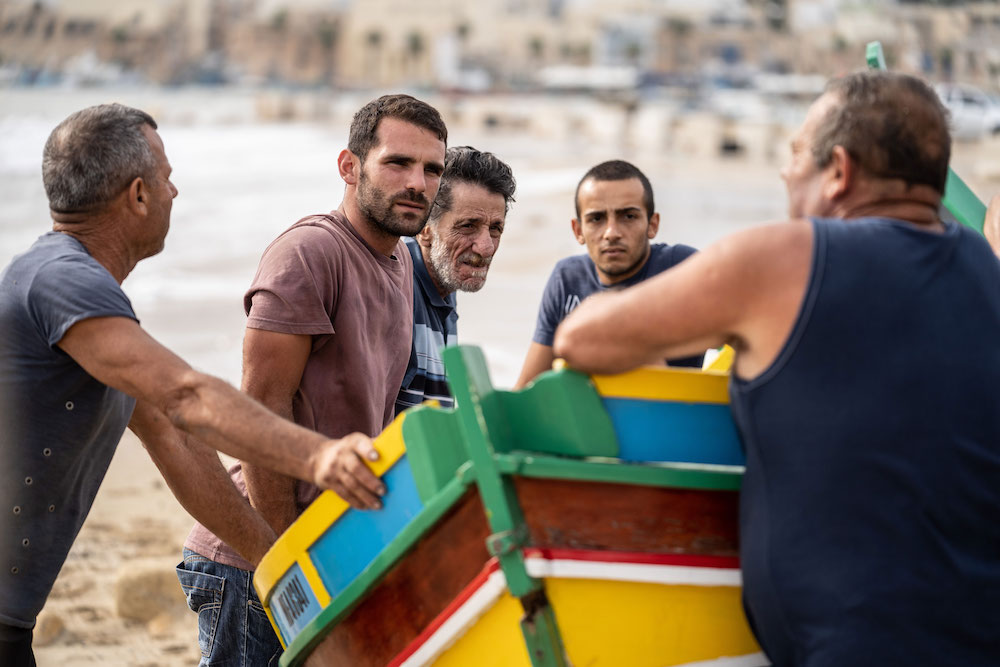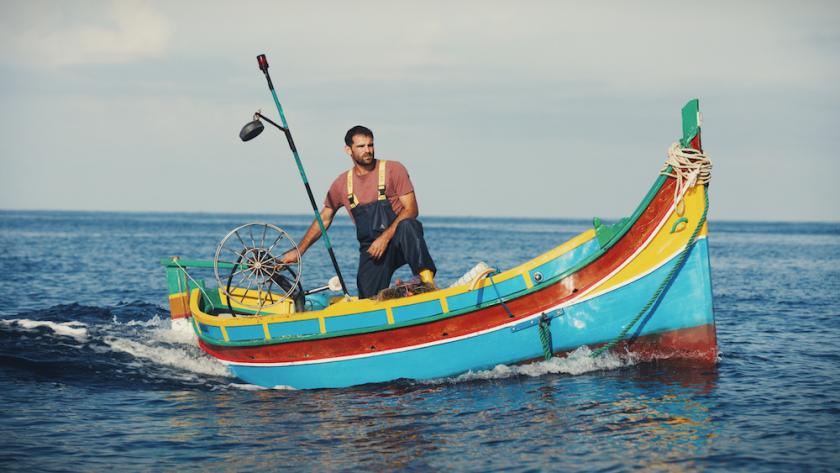In Maltese-American Alex Camilleri’s debut feature, it’s a case of follow the swordfish. This terrifically atmospheric, almost documentary-like film – Camilleri cites Italian neo-realism, including Visconti’s La Terra Trema, as an influence – tells the story of Jesmark, a real-life Maltese fisherman (Jesmark Scicluna). It also encapsulates a dying culture.
His brightly coloured wooden boat, known as a luzzu, with eyes painted on its bow, has been handed down to him through generations, but making a living on this ancient vessel in the bureaucratic modern world is fraught with difficulty.
Malta is often used as a movie location – Gladiator, Game of Thrones, Troy, Papillon – but it’s rare to find a film in the Maltese language about the country itself, especially one that uses non-actors and real-life fisherman with such seamless authenticity. It’s beautifully and unsentimentally shot by Léo Lefèvre. And Scicluna’s strong, silent charisma carries the film.
When his baby son fails to gain weight and needs expensive medical care, he and his wife, Denise, (impressive newcomer Michela Farrugia) – they're an outstandingly beautiful couple, pictured below – are stymied. He earns very little, partly because of the EU closed season fishing rules, where catching certain fish – bring on the swordfish – is illegal. Denise is a waitress. They can’t even afford the €40 milk formula or the €300 immunisations. Denise’s family is wealthy, bourgeois and snooty about Jesmark's work, ignoring its long tradition – “Fishing is a nice way to waste a summer,” says her self-satisfied, controlling mother (Frida Cauchi) – and he hates the idea of accepting their money. But the baby’s needs come first, and Denise goes to stay with her parents, allowing her mother to arrange doctors’ appointments. He visits, but brings the wrong kind of baby formula. “You can’t give him this cheap stuff, it will give him gas,” says Denise’s mother coldly, and he trudges off.
Denise’s family is wealthy, bourgeois and snooty about Jesmark's work, ignoring its long tradition – “Fishing is a nice way to waste a summer,” says her self-satisfied, controlling mother (Frida Cauchi) – and he hates the idea of accepting their money. But the baby’s needs come first, and Denise goes to stay with her parents, allowing her mother to arrange doctors’ appointments. He visits, but brings the wrong kind of baby formula. “You can’t give him this cheap stuff, it will give him gas,” says Denise’s mother coldly, and he trudges off.
Jesmark’s left with a leaking luzzu, something else that he can’t afford to put right. A group of older fishermen encourage him to look after it: he mustn’t let it dry out, wood is a living thing. His father’s legendary prowess is invoked often, making Jesmark feel even more inadequate. He goes out fishing with his brother David (played by his cousin, David Scicluna) and there are slim pickings, apart from that valuable, illegal swordfish, which he kills but has to throw, pointlessly, back into the sea.
“We’ve been fishing like this for a thousand years,” complains Jes. But it’s his brother’s boat, and David doesn’t want to take the risk of a random inspection. There follows a scene of haggling at the hectic fish auction, where the odds seem stacked against them and the hawker refuses to sell the best part of their catch. This isn't a one-sided story: the dangers of over-fishing and climate change are mentioned. But Jesmark's concern is how to survive right now.
He gets drawn, out of desperation, into an underworld of smuggling, sabotage, bribery and fish fraud. Other people, it seems, are selling swordfish, or passing pieces of fish off as scallops. He meets an itinerant Asian sea worker, the light-hearted Uday (Uday McLean) who lives on his own boat, and, speaking English, they fish together at night, following markers that show where fish have been jettisoned. “I’ve never been off this island,“ says Jesmark. “A fish stays in a bowl, it never grows,“ says Uday rather harshly, but the two remain friends. In a dream-like backdrop, we see Jesmark working on his blue, yellow and maroon luzzu. Slowly the leak is caulked with silicone and its faulty parts are replaced. The priest blesses it, the other fishermen are triumphant and tell tall tales about his grandfather’s voyages. The baby’s painted footprints are pressed on, beside Jesmark’s own faded ones. But he knows this way of life is doomed. Denise’s uncle gets her a job as a graphic designer and she wants their baby, who’s now safely in the average percentile, to have more than traditional fishing can provide.
In a dream-like backdrop, we see Jesmark working on his blue, yellow and maroon luzzu. Slowly the leak is caulked with silicone and its faulty parts are replaced. The priest blesses it, the other fishermen are triumphant and tell tall tales about his grandfather’s voyages. The baby’s painted footprints are pressed on, beside Jesmark’s own faded ones. But he knows this way of life is doomed. Denise’s uncle gets her a job as a graphic designer and she wants their baby, who’s now safely in the average percentile, to have more than traditional fishing can provide.
Modern life and family demands prevail. He’s forced to decommission his beloved boat, as per the EU policy of reducing fishing fleets and moving fishermen into other industries. He takes the EU buy-out and a new, uncertain chapter begins. But he’s able to pass the story of the luzzu – even if not the boat itself – to his son.















Add comment